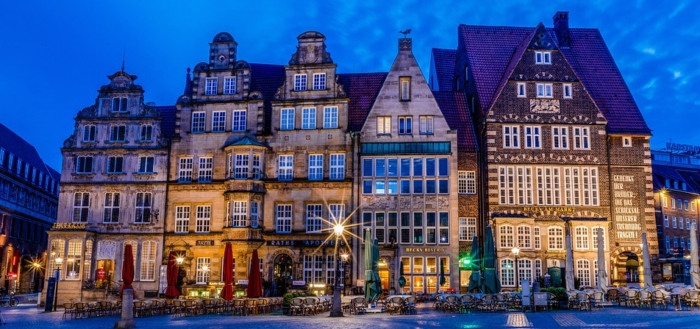German names are unique both because of their simplicity and complexity. Their simplicity refers to the fact that the most popular family names from this culture are almost exclusively occupational surnames, meaning that they denote certain professions, usually from the past, while given names are usually international and indicate the gender of a person. On the other hand, their complexity relies on the fact that both family and given names contain name elements, special particles, standing either at the beginning or at the end of a name and also, most importantly, they carry a specific meaning that we can translate.
German Family Names
The most popular German family names are all occupational surnames. Most of them reflect the professional landscape of older times. In Bauer Ingrid’s article “The Top 100 German Surnames.” (2020) she mentions the top of the list, which is the name Müller, the German term for a miller. This is followed by Schmidt which is just as popular as its English counterpart, Smith. Almost 1 in 100 people in Germany bear Schmidt as a surname. If we go to certain regions of the country, the probability is even higher: in Thuringia, every 60th person is called Schmidt!
Names like Schulz, Wagner, Meyer, or Hoffman also make it to the top ten despite being outdated in terms of our present reality. Schulz was someone we might call a mayor today. In medieval times, he was a village constable or sheriff. Wagner was a wagon maker or wagon driver. Meyer was the headman of the household, also meaning free farmer. Someone named Hoffman bears the family name that denoted a steward who managed other people’s properties.
German Given names
The most highly used given names in Germany have been in a continuous change over the last decade, as they went from traditional, German, or Germanic names to names with more international flair. Female given names such as Gertrud, Bertha, Frieda, Ute, or Hildegard were among the most popular German names in the 1950s and ‘60s, but in more recent years, they were replaced by names like Sarah, Michelle, Hannah, Emma, or Sophia. A similar phenomenon happened to male given names that went from Günter, Jürgen, Klaus, Hans, and Jörg to some more modern ones, such as Ben, Luis, Luca, Noah, or Elias. The names that throughout the years remained at the top of the official rankings posted by the Association for the German Language, are Marie, for girls, and Christian and Maximilian for boys. This shows a predilection towards international, yet still traditional, non-exotic names among German people. But what about parents who want to give special, extravagant names to their children?
German Naming Laws
In Germany, there is a special Committee that establishes if a name is legally acceptable or not. The main naming rule is to choose a name that reflects the child’s gender and that would not cause any reason for denigration or humiliation based on their name later on in someone’s life. Considering these requirements, the names Lord, Borussia, Peanut, Ferrari, and Gucci were refused. These names not only do not reflect the gender of a person but, moreover, they could cause suffering and mean remarks from other people. Even though some names are very similar in nature to banned names, they can sometimes still get accepted by the Committee. So, there are some extravagant, funny, even strange names that made it to the list: Fanta, Galaxina, and Emma Tiger are names that German parents can now choose for their babies. If you would like to find out more about banned names in different countries around the world, you can read our blog article Forbidden Names from Around the World.
Compound German Surnames: Name Elements
The German language is famous for its really long words. But does this apply to German names too? When seeing the length of these words, one might think that they are impossible to understand. The truth is, one must only section them and look at the constituent parts individually. Let’s begin with the word Staubsauger, which means vacuum cleaner. Staub means “dust” and Sauger means “cleaner”. It is pretty self-explanatory, so it should seem pretty easy!
This is the case with many German family names too. They have a specific meaning behind them and their constituent parts can be understood when taken individually. Let’s try this name:
Grünewald consists of grün which means green and Wald, meaning forest. Now it doesn’t seem so scary anymore.
There are certain elements that occur in many names. They can stand at the beginning of a name, as a prefix, but also at the end, as a suffix, which makes them something called name elements. These terms are usually words that describe natural elements, colors, or general characteristics. Maybe some of the following compound family names are a bit easier to grab.
Althaus, for example, contains alt standing for old and Haus for house. But haus can be preceded by other elements too, for example, Berg, which will create the name Berghaus, which then could translate to someone who has their house in the mountains.
A Baum is a tree and it is a name element, which can be part of family names like Apfelbaum, an apple tree, or Baumbach – Baum meaning tree and Bach meaning river.
You may come across Thal in many German names. It means valley and it appears in names like Blumenthal, which is literally a valley full of flowers, a beautiful image one should be lucky to have as a family name.
When searching for other interesting or funny German surnames with a similar structure, we found examples like:
- Schweinsteiger(„pig-climber“)
- Hühnerbein(chicken-leg)
- Bratfisch(fried fish)
- Handschuh(glove)
- Bierwagen(beer cart)
Not only family names can contain name elements, but given names too. A very popular name element is man/mann, which appears in Hermann and simply means “person”. Hard refers to a brave, courageous individual, whose name could then be Erhard. Hild means “battle” and it can be found in the female given name Hildegard. The name Norbert contains the name element bert/berth, translating to something bright, full of light. Helm, meaning protection, could be found in the male given name Helmut, but if we go one step further, and add another name element to it, such as fried, which can be translated as “peace”, we get the name Helmfried.
All these examples demonstrate the fact that German names are rather fun than complicated and can brighten up someone’s cloudy day. We hope this article may inspire you to look behind the meaning of German names and name elements and be able to see their uniqueness. What German names do you find most interesting?
Sources: Bauer, Ingrid. “The Top 100 German Surnames.” ThoughtCo, Aug. 28, 2020.











